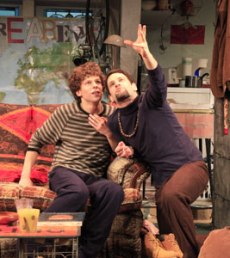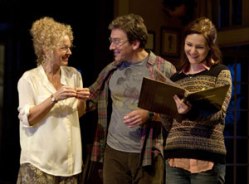Category: "Review"
Review: Godspell
Nov 8th

Just in case you didn’t you didn’t get your hippy-dippy fix with the recent revival of Hair, there’s now the 40th anniversary production of Godspell to help you get your groove on. Stephen Schwartz’s 1971 musical, conceived and originally directed by John-Michael Tebelak, retells the story of Jesus through a series of musical numbers adapted from the Gospel of St. Matthew. In this new version conveniently playing next door to the same composer’s Wicked, you’ll hear references to, among other things, Steve Jobs, Facebook, the birther controversy, Donald Trump, Occupy Wall Street and Lindsay Lohan.
Don’t remember such things from your Bible studies class? Not to worry. This version is designed to be strictly of the moment, as contemporary as a special episode of Glee, which is it most closely resembles.
Your tolerance for this sort of thing will depend on whether you find the idea of the above gags amusing and the prospect of being invited onstage at intermission to mingle with the cast and partake of some “wine” appealing.
To be fair, the mostly young audience ate it up. But to also be fair to those of us of a certain age, they probably haven’t sat through innumerable previous productions of the show, or seen the lamentable film version.
The relentless jokiness of the proceedings, which is thankfully alleviated in the second act—presumably that’s because it’s hard to have quite as much fun with such matters as Judas’ betrayal and the Crucifixion—becomes tiresome.
Not that the evening is without its pleasures. They are chiefly derived from Schwartz’s tuneful pop/rock score, which contains such memorable numbers as “Day by Day” and “Turn Back, O Man,” and the amazingly high energy of the youthful ensemble, who perform as if their life depends on it. The sole weak link was Hunter Parrish (Weeds) as Jesus, who lacks the voice to put over the ballads or the charisma to be convincing as the leader of a new religion. Of course, his hunky good looks went a long way towards overcoming these deficiencies for the young women in attendance, who seemed to melt every time he flashed his toothy grin. Which was a lot.
Director Daniel Goldstein certainly makes excellent use of the intimate Circle in the Square space, having the actors running up and down the aisles while making every effort to directly engage with audience members. The staging even has the band members situated throughout the auditorium, wailing away on their electric guitars. Like everything else about the show, such the overly aggressive musical arrangements, they seemed to be trying too hard.
Circle in the Square, 1633 Broadway. 212-239-6200. www.Telecharge.com.
Review: Sons of the Prophet
Nov 7th

Santino Fontana continues to emerge as one of the great talents of the New York stage in Sons of the Prophet, the latest confident from Stephen Karam. As some might remember, it was another Karam work, Speech and Debate, that inaugurated the Roundabout Underground four seasons ago. And so Prophet, which runs at the Roundabout main stage space the Laura Pels Theatre, represents the continued growth of two forces attached to the show: its leading actor and its very creator.
Prophet is a cluttered play that never quite moves in the linear ways we expect it to, charting as it does a period of epic change in the life of 29-year-old Joseph Douaihy (Fontana), who, like Karam himself, is a Pennsylvania-bred gay man of Lebanese descent. Hopefully unlike Karam, however, is the series of Job-like trials Joseph finds himself enduring.
An erstwhile runner with the potential to compete at the Olympics, Joseph has begun to experience an inflammation in his knees and additional symptoms that defy easy medical classification. Far worse, his father has passed away due to a heart attack that may or may not have been caused by a car accident when he drove into a deer decoy planted as a prank. This forces a change in his family dynamic once his ailing uncle Bill (Yusef Bulos) decides to move in with Joseph and his younger, also gay, brother Charles (Chris Perfetti).
Other complications ensue when Joseph meets and falls for a handsome news reporter, Timothy (Charles Socarides), covering the fallout from the deer accident. At the same time, the Douaihys are conflicted over the proper way to punish Vin, (Jonathan Louis Dent), the high school football star responsible for it. And Gloria (Joanna Gleason), Joseph’s seemingly absent-minded publishing boss, keeps pressing him to turn his Maronite family’s history into book fodder.
Karam demonstrates a keen understanding of both pain and suffering, and the difference between the two – that as awful as pain may be, whether it be physical or emotional, it’s easier to deal with hurt that can be explained than that which lingers without explanation or even the promise of relief. Prophet’s characters are all woeful in their own way. Even Gloria and Vin are haunted by ghosts of their damaged pasts. Director Peter DuBois reins in all of these story arcs with the right balance of sensitivity and a humor that borders, but never trespasses, on the absurd. The show recognizes that comedy can emerge in the most serious of moments, and how even the tensest of situations can eventually feel banal. Take, for example, a scene in which Joseph and Charles fight following the former’s spinal tap. Or an ongoing funny-sad gag in which Uncle Bill must leave the door open while using the toilet.
The playwright achieves this by couching Prophet as a reinterpretation of Khalil Gibran’s massive seller, The Prophet. Superscripts create chapters for Joseph’s journey based on the book, such as “On Pain,” “On Friendship,” and “On Reason & Passion.” Karam has a lot on his plate, but the crowded play is never clumsy. He examines every aspect of Joseph’s torment, recognizing that the people in his life who frustrate him the most are also the ones that might offer the most succor. (The character of Gloria, is the only one that times borders on caricature.)
As such, the acting in Prophet is uniformly terrific (Lizbeth Mackay and Dee Nelson offer solid work in a series of supporting roles). What is most curious is how several of these actors – Bulos, Gleason, Socarides – are able to communicate so much about their characters while still keeping secrets about their motivations. Fontana, on the other hand, bares Joseph’s scared, weary soul in a performance that doesn’t have a false note and calls no unnecessary attention to the many small but essential strokes of genius that the performer utilizes to bring this subtle, distinctive character to life.
Unlike the mysterious malady that plagues Joseph, it’s all too easy to trace the source of Prophet’s searing glory: the clever Karam. One is hopeful that it is not long before his symptoms appear yet again in some form on the stage.
----- Doug Strassler
Laura Pels Theatre, 111 West 46th Street, 212-719-1300. www.roundabouttheatre.org
Review: Asuncion
Nov 3rd

Jesse Eisenberg certainly hasn’t written an attractive part for himself in his debuting playwriting effort, now being presented by the Rattlestick Playwrights Theater. In his dark comedy Asuncion, the Oscar-nominated star of The Social Network plays Edgar, a journalistic blogger whose reformist ideals are undercut by his clueless political correctness. The sort of spineless twerp who excuses the youths who keep mugging him because of their lower social standing, he also continually debases himself in his strange, sadomasochistic relationship with his roommate Vinny (Justin Bartha).
Vinny, working for a PhD in Black Studies, is a carefree, pot-smoking ne’er do well who likes to hang out in his bathrobe and bang out rhythms on his bongo drums. But he also displays a truly nasty side, particularly towards Vinny, who seems to be in sexual thrall to him.
The two men find their lives uprooted by the arrival of Edgar’s successful older brother Stuart (Remy Auberjonois) and his beautiful new Filipino bride Asuncion (Camille Mana). Stuart asks that the pair babysit Asuncion for a few days while he takes care of some mysterious business. In one of the play’s more contrived plot elements, he apparently feels that the duo’s messy bachelor pad apartment is the perfect hiding place.
Vinny is delighted by the new arrival, but Edgar, hearing that his brother met Asuncion on the Internet, assumes that she is either a sex slave or mail order bride, and determines to interview her for what he feels will be his journalistic breakthrough.
Eisenberg has some interesting ideas to express here about cultural clashes and underlying prejudices, and he also displays a knack for crafting sharply funny one-liners. But he’s less successful in terms of dramatic structure and narrative credibility, with the result that the play never successfully coheres, wandering off in too many disparate directions.
Still, under the breezy direction of Kip Fagan the evening is quite entertaining, with both Eisenberg and Bartha delivering terrifically amusing performances. The latter in particular is a droll delight, investing his portrayal with enough daffy physical humor to suggest that he’s been wasted in the hugely successful Hangover movies. Mana is charming as the fun-loving Asuncion, and Auberjonois is suitably smarmy as the condescending brother.
Cherry Lane Theatre, 38 Commerce St. 212-352-3101. www.Rattlestick.org.
Review: We Live Here
Nov 3rd

I don’t envy actress-turned-emerging-playwright Zoe Kazan; it’s hard to write a family play that steers clear of the usual tropes of long-simmering resentment and buried history. Her second work, We Live Here, arrives at Manhattan Theatre Club’s City Center space in the estimable hands of director Sam Gold, but at the end of the day, Kazan’s plays feels all too familiar, which, yes, breeds contempt.
The play’s contrived premise finds Allie Bateman (Jessica Collins) rushing into a wedding with her painter fiancé Sandy (Jeremy Shamos) a mere six months after first meeting him. (For unexplained reasons, the two have waited to consummate their union). College-age younger sister Dinah (Betty Gilpin, a bundle of jittery nerves here) returns from New York to the New England home of parents Lawrence and Maggie (Mark Blum and Amy Irving) for the wedding. It’s the first time that she will have met Sandy as well as told her parents that she is dating Daniel (Oscar Isaac), a revelation that is a bombshell not just because he is more than a decade Dinah’s senior but because he also dated Annie, Allie’s twin who died when she was a teenager and Dinah a very young girl.
We Live Here’s first act makes for an adroit, if dramatically inert setup, as we wait to see the ripple effect Daniel’s re-entry causes. Gold, who in delicate works like Circle Mirror Transformation and Kin has managed to mine harrowing material out of even the most mundane of circumstances and bring the interior to electrifying life, creates a convincing family portrait. The Bateman’s connections feel real, and even more so, John Lee Beatty’s wonderful set creates the sense of a truly lived-in home rather than a merely polished set. And Kazan has a feel for authentic, thoughtful adult dialogue (We Live Here is the first play in which I have ever seen a character use the word “sanguine” both correctly and appropriately).
But the payoff is ultimately minimal, as Kazan cheapens We Live Here’s rich potential in a second act that offers a useless flashback, turns the character of Daniel into a cliché, and, most of all, offers some condescending armchair psychology on the concept of loss. Instead of sharp observations, the plot detours into lazy convention and an unsubtle ending that even Gold cannot manage to make organic. As a result, the show manages to be both portentous and pretentious.
Collins does admirable work showing how the loss of her twin still reverberates within Allie; it doesn’t take much to provoke her in ways that cause her to lash out at her loved ones. But because she is playing a character significantly younger (and, likely, less self-aware) than herself, Gilpin’s portrayal calls too much attention to itself to feel authentic. Irving, whose hoarse voice is ill-equipped for the City Center stage, is also unable to dig beneath her two-dimensional role to find the grace notes that would humanize the paralyzed ice queen that is Maggie.
Gold gets more solid work from two of the male members of the We Live Here cast, who provide insight into their characters; inner worlds without feeling forced to project them sky high. Shamos makes the sensitive Sandy, whose father abandoned him at a young age, a nice contrast to the unstable Bateman clan. And Blum manages to transform an academic lecture into look at his own mentality. Kazan’s eagerness to turn Daniel into a cipher, however, makes Isaac at a loss to justify much of his character.
In choosing to chart family ties, it would seem that Kazan has unfortunately bound herself too tight.
----- Doug Strassler
Manhattan Theatre Club City Center, 131 W. 55th St., 212-581-1212. www.nycitycenter.org
Review: Relatively Speaking
Oct 21st

Relatively Speaking, the new evening of comic one-acts by Woody Allen, Elaine May and Ethan Coen, has just opened on Broadway, and all I can say is…oy! That this level of writing talent--not to mention an estimable cast of many comedic pros--could produce such a lethargic, laugh-free evening is a mystery and a tremendous disappointment.
Truth be told, none of the authors’ playwriting efforts, at least in recent years, has been particularly good—there’s a good reason that May doesn’t include the Broadway flop Taller Than a Dwarf in her credits. But there were high hopes for this production directed by actor John Turturro.
Coen’s relatively brief curtain-raiser, Talking Cure, is as baffling as it is unfunny. The first scene depicts the charged interaction between a surly mental hospital patient (Danny Hoch)--a postal office worker who went postal on a customer--and a psychiatrist (Jason Kravits). The action then segues to a suburban home in the 1950s, where a long-married couple (Allen Lewis Rickman, Katherine Borowitz), presumably the patient’s parents, is squabbling. None of it makes much of an impression.
May’s seemingly interminable (actually, a little more than 50 minutes) George is Dead marks the welcome return of Marlo Thomas to the Broadway stage. Unfortunately, the actress, who looks stunning at age 73, is trapped in the one-note role of Doreen, a wealthy socialite who has just lost her husband in a skiing accident. Infantile and helpless, she shows up at the apartment of Carla (Lisa Emery), the daughter of the nanny she had as a child. There she makes endless selfish demands on her host, who is in the middle of a vicious argument with her husband (Grant Shaud). It’s a one-joke premise, and the joke isn’t funny at that.
Allen’s contribution demonstrates that the veteran funnyman hasn’t lost his ability to craft amusing one-liners. They flow fast and furiously in Honeymoon Hotel, but the thin sketch feels like a relic, something that definitely wouldn’t have passed muster at Your Show of Shows, where the young Allen worked as a writer. It concerns a middle-aged novelist, Jerry (Steve Guttenberg), who runs off with his son’s nubile bride-to-be (Ari Graynor) on their wedding day, only to be pursued to the tacky titular setting by numerous interested parties. They include Jerry’s furious wife (Caroline Aaron); his best friend (Shaud); the jilted bridegroom (Bill Army); the bride’s parents (Julie Kavner, Mark-Linn Baker); the clueless rabbi (Richard Libertini) and Jerry’s hapless shrink (Kravits). Eventually, a Brooklynese-talking pizza delivery man (Hoch) shows up to impart some working-class wisdom to the self-absorbed group.
Even with some admittedly funny jokes and a dream cast of supporting comic players (where has the great Libertini been all these years?), the piece feels strained and vacuous. And considering Allen’s own controversial romantic issues, it also comes across as more than a little bit tacky.
Not helping matters is the leaden direction by Turturro, who based on this evidence doesn’t seem to have a comic bone in his body. Although to be fair, not even a Mike Nichols or Gene Saks would have been able to bring anything to these futile exercises.
Brooks Atkinson Theatre, 256 W. 47th St. 877-250-2929. www.ticketmaster.com.